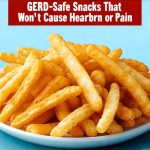The modern diet often includes a significant amount of fat, from obvious sources like fried foods and butter to less apparent ones hidden in processed snacks and even seemingly healthy options like avocados and nuts. While fats are essential for overall health – providing energy, supporting cell growth, and aiding nutrient absorption – consuming high-fat foods can significantly impact digestive comfort for many individuals. Understanding how these foods affect our digestion is key to making informed choices and minimizing potential discomfort. This article will explore the relationship between dietary fat intake and digestive well-being, looking at the physiological processes involved and common experiences related to high-fat food consumption.
Digestive systems vary greatly from person to person; what one individual tolerates comfortably, another might find problematic. Factors like pre-existing conditions, overall diet, stress levels, and even genetics can all play a role in how we process fats. This exploration isn’t about demonizing fat but rather understanding its influence on our digestive system so we can navigate dietary choices with greater awareness and promote comfortable digestion.
Understanding Fat Digestion
The digestion of fat is a complex process that begins in the mouth, though minimally. The majority of fat digestion occurs in the small intestine. Enzymes called lipases break down fats into smaller molecules which are then absorbed by the body. This entire process requires assistance from bile, produced by the liver and stored in the gallbladder; it emulsifies fats, making them easier to digest. A slower digestive process, coupled with a larger quantity of fat, can often lead to feelings of fullness or discomfort.
The amount of time it takes to digest fat is considerably longer than carbohydrates or proteins. This prolonged digestion can contribute to sensations of bloating and sluggishness after consuming high-fat meals. The body dedicates more resources to processing fats, potentially slowing down the digestion of other nutrients as well.
Common Digestive Symptoms & High-Fat Foods
Many people experience noticeable digestive symptoms after eating a meal rich in fat. These aren’t necessarily signs of illness but rather normal physiological responses to the demands placed on the digestive system. The severity and type of symptoms can vary widely, ranging from mild discomfort to more pronounced issues.
Bloating & Gas
Bloating is perhaps the most common complaint associated with high-fat foods. Because fats take longer to digest, they remain in the stomach for an extended period, potentially leading to gas production as bacteria ferment undigested food particles. This can cause abdominal distension and a feeling of fullness even after relatively small portions. Certain types of fats, particularly those found in processed or fried foods, may be more prone to causing bloating due to their composition and potential additives.
The type of fat also matters. Saturated fats, often found in animal products and some plant oils, can slow gastric emptying (the rate at which food moves from the stomach to the small intestine) more significantly than unsaturated fats. This slower movement contributes to increased fermentation and gas production.
Delayed Gastric Emptying & Indigestion
Delayed gastric emptying isn’t just a contributor to bloating; it also manifests as feelings of indigestion, heartburn, or even nausea. When food remains in the stomach for too long, it can put pressure on the lower esophageal sphincter (LES), potentially allowing stomach acid to reflux into the esophagus and causing heartburn. This effect is often exacerbated by large portions and high-fat content.
The sensation of fullness that accompanies delayed gastric emptying can be quite pronounced, leading individuals to feel uncomfortable or sluggish for hours after eating a fatty meal. Simple strategies like smaller portion sizes and avoiding lying down immediately after eating can help mitigate these effects.
Impact on Bowel Movements & Motility
High-fat diets can also influence bowel movements. While fat itself doesn’t directly cause constipation in most individuals, it can indirectly affect gut motility – the speed at which food moves through the digestive tract. A diet consistently high in fat may reduce overall fiber intake, as fatty foods often displace more nutrient-rich options. Fiber is crucial for promoting regular bowel movements and preventing constipation.
Additionally, some people find that consuming large amounts of fat can lead to diarrhea or loose stools. This might be due to malabsorption issues or the gallbladder struggling to effectively emulsify the excessive fat content, resulting in undigested fat reaching the colon.
Ultimately, navigating digestive comfort with high-fat foods involves understanding individual tolerance levels and making informed dietary choices. Paying attention to how different fats affect your body – observing symptoms like bloating, indigestion, or changes in bowel habits – is a valuable step towards optimizing digestive well-being. Prioritizing balanced meals that incorporate fiber, hydration, and mindful portion sizes can all contribute to minimizing discomfort and enjoying food without compromising digestive health.


















